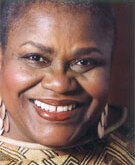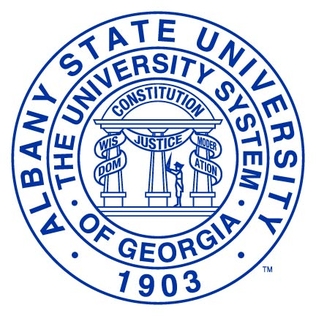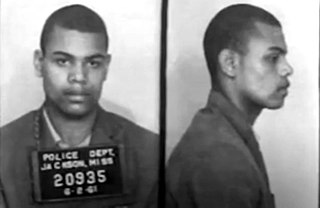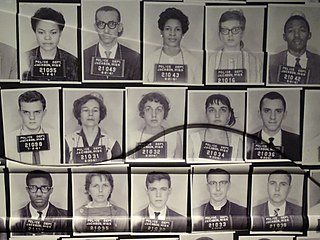Related Research Articles

Bernice Johnson Reagon is a song leader, composer, scholar, and social activist, who in the early 1960s was a founding member of the Student Non-violent Coordinating Committee's (SNCC) Freedom Singers in the Albany Movement in Georgia. In 1973, she founded the all-black female a cappella ensemble Sweet Honey in the Rock, based in Washington, D.C. Reagon, along with other members of the SNCC Freedom Singers, realized the power of collective singing to unify the disparate groups who began to work together in the 1964 Freedom Summer protests in the South.
"After a song", Reagon recalled, "the differences between us were not so great. Somehow, making a song required an expression of that which was common to us all.... This music was like an instrument, like holding a tool in your hand."

The Student Nonviolent Coordinating Committee was the principal channel of student commitment in the United States to the civil rights movement during the 1960s. Emerging in 1960 from the student-led sit-ins at segregated lunch counters in Greensboro, North Carolina, and Nashville, Tennessee, the Committee sought to coordinate and assist direct-action challenges to the civic segregation and political exclusion of African Americans. From 1962, with the support of the Voter Education Project, SNCC committed to the registration and mobilization of black voters in the Deep South. Affiliates such as the Mississippi Freedom Democratic Party and the Lowndes County Freedom Organization in Alabama also worked to increase the pressure on federal and state government to enforce constitutional protections.

Freedom Summer, also known as the Freedom Summer Project or the Mississippi Summer Project, was a volunteer campaign in the United States launched in June 1964 to attempt to register as many African-American voters as possible in Mississippi. Blacks had been restricted from voting since the turn of the century due to barriers to voter registration and other laws. The project also set up dozens of Freedom Schools, Freedom Houses, and community centers such as libraries, in small towns throughout Mississippi to aid the local Black population.

The Southern Christian Leadership Conference (SCLC) is an African-American civil rights organization based in Atlanta, Georgia. SCLC is closely associated with its first president, Martin Luther King Jr., who had a large role in the American civil rights movement.

Ella Josephine Baker was an African-American civil rights and human rights activist. She was a largely behind-the-scenes organizer whose career spanned more than five decades. In New York City and the South, she worked alongside some of the most noted civil rights leaders of the 20th century, including W. E. B. Du Bois, Thurgood Marshall, A. Philip Randolph, and Martin Luther King Jr. She also mentored many emerging activists, such as Diane Nash, Stokely Carmichael, and Bob Moses, as leaders in the Student Nonviolent Coordinating Committee (SNCC).

Toshi Reagon is an American musician of folk, blues, gospel, rock and funk, as well as a composer, curator, and producer.

Albany State University is a public historically black university in Albany, Georgia. In 2017, Darton State College and Albany State University consolidated to become one university under the University System of Georgia (USG). Albany State University has two campuses in Albany and a satellite campus in Cordele.
The Albany Movement was a desegregation and voters' rights coalition formed in Albany, Georgia, in November 1961. This movement was founded by local black leaders and ministers, as well as members of the Student Nonviolent Coordinating Committee (SNCC) and the National Association for the Advancement of Colored People (NAACP). The groups were assisted by Martin Luther King Jr. and the Southern Christian Leadership Conference (SCLC). It was meant to draw attention to the brutally enforced racial segregation practices in Southwest Georgia. However, many leaders in SNCC were fundamentally opposed to King and the SCLC's involvement. They felt that a more democratic approach aimed at long-term solutions was preferable for the area other than King's tendency towards short-term, authoritatively-run organizing.

Cordell Hull Reagon was an American singer and activist. He was the founding member of The Freedom Singers of the Student Nonviolent Coordinating Committee (SNCC), a leader of the Albany Movement and a Freedom Rider during the Civil Rights Movement.

The Freedom Singers originated as a quartet formed in 1962 at Albany State College in Albany, Georgia. After folk singer Pete Seeger witnessed the power of their congregational-style of singing, which fused black Baptist a cappella church singing with popular music at the time, as well as protest songs and chants. Churches were considered to be safe spaces, acting as a shelter from the racism of the outside world. As a result, churches paved the way for the creation of the freedom song. After witnessing the influence of freedom songs, Seeger suggested The Freedom Singers as a touring group to the SNCC executive secretary James Forman as a way to fuel future campaigns. Intrinsically connected, their performances drew aid and support to the Student Nonviolent Coordinating Committee (SNCC) during the emerging civil rights movement. As a result, communal song became essential to empowering and educating audiences about civil rights issues and a powerful social weapon of influence in the fight against Jim Crow segregation. Their most notable song “We Shall Not Be Moved” translated from the original Freedom Singers to the second generation of Freedom Singers, and finally to the Freedom Voices, made up of field secretaries from SNCC. "We Shall Not Be Moved" is considered by many to be the "face" of the Civil Rights movement. Rutha Mae Harris, a former freedom singer, speculated that without the music force of broad communal singing, the civil rights movement may not have resonated beyond of the struggles of the Jim Crow South. Since the Freedom Singers were so successful, a second group was created called the Freedom Voices.
Matthew Jones was an African-American folk singer/songwriter known for being a field secretary of the Student Nonviolent Coordinating Committee and part of their The Freedom Singers in the 1960s. Jones was from Nashville, Tennessee, but also worked as a school teacher in Macon, Georgia. He was arrested 20 times for this civil rights activism.

Bernard Lafayette, Jr. is an American civil rights activist and organizer, who was a leader in the Civil Rights Movement. He played a leading role in early organizing of the Selma Voting Rights Movement; was a member of the Nashville Student Movement; and worked closely throughout the 1960s movements with groups such as the Student Nonviolent Coordinating Committee (SNCC), the Southern Christian Leadership Conference (SCLC), and the American Friends Service Committee.

Freedom Riders were civil rights activists who rode interstate buses into the segregated Southern United States in 1961 and subsequent years to challenge the non-enforcement of the United States Supreme Court decisions Morgan v. Virginia (1946) and Boynton v. Virginia (1960), which ruled that segregated public buses were unconstitutional. The Southern states had ignored the rulings and the federal government did nothing to enforce them. The first Freedom Ride left Washington, D.C., on May 4, 1961, and was scheduled to arrive in New Orleans on May 17.

Charles Melvin Sherrod was an American minister and civil rights activist. During the civil rights movement, Sherrod helped found the Albany Movement while serving as field secretary for southwest Georgia for the Student Nonviolent Coordinating Committee. He also participated in the Selma Voting Rights Movement and in many other campaigns of the civil rights movement of that era.

Monroe Comprehensive High School (MCHS) is a four-year secondary school located in Albany, Georgia, United States. It is one of three high schools in the Dougherty County School System, which also includes Dougherty Comprehensive High School and Westover Comprehensive High School.

The Black Bottom Historic District is a historic African American community located in Russellville, Kentucky. It is bounded by E. 5th and 7th Sts., Bowling Green Rd. and Morgan St.
McCree L. Harris was an American educator and political activist leader. Harris worked at the all-Black Monroe Comprehensive High School, where she taught Latin, French, and Social Studies. She is best known for her participation with the Freedom Singers and for encouraging her students' involvement in the Civil Rights Movement through voter registration marches and by leading groups of students to downtown Albany, Georgia, after school hours to test desegregation rulings at local stores and movie theaters.
Joseph Charles Jones was an American civil rights leader, attorney, co-founder of the Student Nonviolent Coordinating Committee (SNCC), and chairperson of the SNCC's direct action committee.
Meryle Joy Reagon is an American civil rights movement activist born in 1942. In June 1961, she participated in a Freedom Ride from Montgomery, Alabama to Jackson, Mississippi. She is also the former wife of another Freedom Rider, Frederick Leonard and sister of Cordell Reagon.
Music and Black liberation refers to music associated with Black political movements for emancipation, civil rights, or self-determination. The connection between music and politics has been used in many cultures and was utilized by blacks in their struggle for freedom and civil rights. Music has been used by African Americans over the course of United States history to express feelings of struggle and hope, as well as to foster a sense of solidarity to aid their fight for liberation and justice. African Americans have used music as a way to express their struggle for freedom and equality which has spanned the history of the United States which has resulted in the creation and popularization of many music genres including, jazz, funk, disco, rap, and hip hop. Many of these songs and artists played pivotal roles in generating support for the civil rights movement.
References
- 1 2 3 Asim, Jabari (May 17, 2004). "Charles Neblett, Fighting for Our Rights". The Washington Post. Retrieved April 30, 2014.
- 1 2 "Music: Freedom Singers". Bernice Johnson Reagon. Archived from the original on 2014-05-02. Retrieved 2014-05-04.
- 1 2 3 4 5 6 "Former Freedom Rider recalls civil rights movement at UW-W." Janesville Gazette [Janesville, WI] September 28, 2012. Opposing Viewpoints in Context. November 6, 2015. Web.
- 1 2 3 4 "Russellville's Charles Neblett: Founding Member of the Freedom Singers". WKU radio. February 11, 2011. Retrieved November 15, 2015.
- 1 2 3 4 Seeger, Pete, and Bob Reiser. Everybody Says Freedom. W.W. Norton and Company Inc., New York City,1989. Print.
- 1 2 3 "SNCC Freedom Singers 1962–1966". BlackPast.org. 9 March 2014. Retrieved November 15, 2015.
- ↑ Paige Rose, Leslie. (2007). The Freedom Singers of the civil rights movement: Music functioning for freedom. Update: Applications of Research in Music Education , 25(2), 59.
- 1 2 "Neblett a Special Guest at the White House" The Loga Journal February 10, 2010. November 6, 2013. Web.
- ↑ "Announcing 2010 Inductees to KY Civil Rights Hall of Fame". Kentucky.gov. 2010-10-15. Retrieved 2014-05-04.